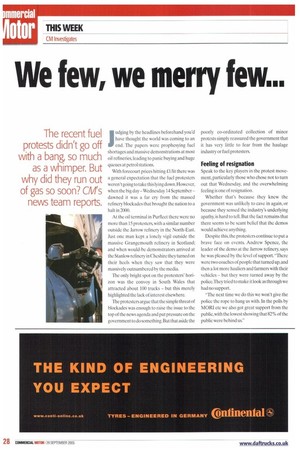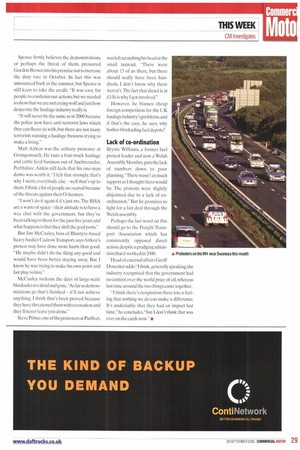We few, we merry few...
Page 28

Page 29

If you've noticed an error in this article please click here to report it so we can fix it.
The recent fuel protests didn't go off with a bang, so much as a whimper. But why did they run out of gas so soon? CM's news team reports.
iludging by the headlines beforehand you'd have thought the world was coming to an end. The papers were prophesying fuel shortages and massive demonstrations at most oil refineries, leading to panic buying and huge queues at petrol stations.
With forecourt prices hitting £1 /lit there was a general expectation that the fuel protesters weren't going to take this lying down. However, when the big day —Wednesday 14 September— dawned it was a far cry from the massed refinery blockades that brought the nation to a halt in 2000.
At the oil terminal in Purileet there were no more than 15 protesters, with a similar number outside the Jarrow refinery in the North-East, Just one man kept a lonely vigil outside the massive Grangemouth refinery in Scotland; and when would-be demonstrators arrived at the Stanlow refinery in Cheshire they turned on their heels when they saw that they were massively outnumbered by the media.
The only bright spot on the protesters' horizon was the convoy in South Wales that attracted about 100 trucks — but this merely highlighted the lack of interest elsewhere.
The protesters argue that the simple threat of blockades was enough to raise the issue to the top of the news agenda and put pressure on the government to do something. But that aside the poorly co-ordinated collection of minor protests simply reassured the government that it has very little to fear from the haulage industry or fuel protesters.
Feeling of resignation
Speak to the key players in the protest movement, particularly those who chose not to turn out that Wednesday, and the overwhelming feeling is one of resignation.
Whether that's because they knew the government was unlikely to cave in again, or because they sensed the industry's underlying apathy, is hard to tell. But the fact remains that there seems to be scant belief that the demos would achieve anything.
Despite this, the protesters continue to put a brave face on events, Andrew Spence, the leader of the demo at the Jarrow refinery, says he was pleased by the level of support. -There were two coaches of people that turned up, and then a lot more hauliers and farmers with their vehicles — but they were turned away by the police.They tried to make it look as through we had no support.
"The next time we do this we won't give the police the rope to hang us with, In the polls by MORI etc we also got great support from the public, with the lowest showing that 82% of the public were behind us." Spence firmly believes the demonstrations, or perhaps the threat of them, pressured Gordon Brown into his promise not to increase the duty rate in October. In fact this was announced back in the summer, but Spence is still keen to take the credit. "It was easy for people to condemn our actions, but we needed to show that we are not crying wolf and just how desperate the haulage industry really is.
-It will never be the same as in 2000 because the police now have anti-terrorist laws which they can fleece us with, but there are not many terrorists running a haulage business trying to make a living."
Matt Aitken was the solitary protester at Grangemouth. He runs a four-truck haulage and cattle feed business out of Auchterarder, Perthshire. Aitkin still feels that his one-man demo was worth it. "I felt that strongly. that's why I went; everybody else well that's up to them.] think a lot of people are scared because of the threats against their 0-licences.
"I won't do it again if it's just me. The RHA are a waste of space their attitude is to have a wee chat with the government, but they've been talking to them for the past live years and what happens is that they shift the goal posts."
But Jim McCauley, boss of Blantyre-based heavy haulier Cadzow Transport, says Aitken's protest may have done more harm than good. "He maybe didn't do the thing any good and would have been better staying away. But I know he was trying to make his own point and fair play to him."
McCauley reckons the days of large-scale blockades are dead and gone."As far as demonstrations go that's finished it'll not achieve anything. I think that's been proved because they have threatened them with revocation and they'll never leave you alone.
Steve Prince,one of the protesters at Purfleet, was left scratching his head at the small turnout. "There were about 15 of us there, but there should really have been hundreds. I don't know why there weren't. The fact that diesel is at £1/lit is why! got involved."
However, he blames cheap foreign competition for the UK haulage industry's problems, and if that's the case, he says, why bother blockading fuel depots?
Lack of co-ordination
Brynle Williams. a former fuel protest leader and now a Welsh Assembly Member, puts the lack of numbers down to poor planning. "There wasn't as much support as I thought there would be. The protests were slightly disjointed due to a lack of coordination." But he promises to fight for a fair deal through the Welsh assembly.
Perhaps the last word on this should go to the Freight Transport Association which has consistently opposed direct action,despite a grudging admission that it worked in 2000.
Head of external affairs Geoff Dossctter think,generallyspeaking,the industry recognised that the government had no control over the world price of oil, whereas last time around the two things came together.
"I think there's resignation there too, a feeling that nothing we do can make a difference. It's undeniable that they had an impact last time," he concludes,"but I don't think that was ever on the cards now." •






























































































































































































